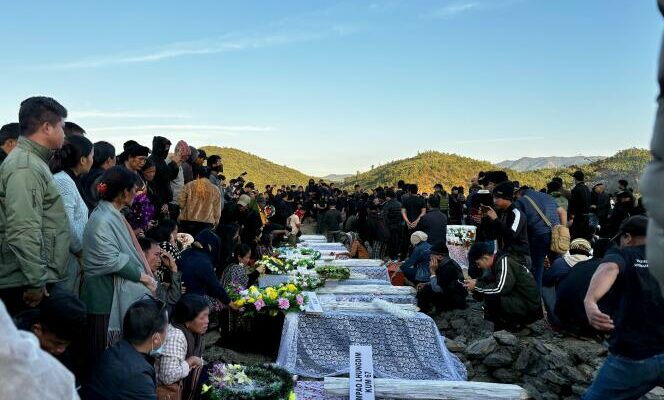The coffins arrived at Sehken village in Churachandpur district on December 20, 2023. In all there were 87. They contained the mutilated and charred bodies of men, women and children from Christian and Christian tribes. Jews, died seven months earlier and never returned by the government. Since then, the deceased had been lying in morgues in Imphal, the regional capital of Manipur, until the Supreme Court of India ordered authorities to return them to the families.
Covered with a black cloth, they were placed before Reverend Thangkhosei Haokip. “We are the warrior sons and daughters of [l’ethnie] kuki-zo. Even death cannot stand in our way.”, thundered the clergyman in Thado, a Sino-Tibetan language, without being able to mask his anger. In front of him, a huge crowd, thousands of people, a few young men with black headbands and raw rage in their eyes stood up and applauded.
The farewell ceremony for the victims took place in the heart of the tribal area of Manipur, on the Indo-Myanmar border. This tiny state in northeast India, led by Narendra Modi’s Bharatiya Janata Party (Indian People’s Party, BJP), is on the brink of civil war: it has been ravaged by conflict for a long time. inter-ethnic and religious which has become, since May 3, 2023, a national political issue despite the lack of initial reactions from the Indian government after an unprecedented outbreak of violence.
From a black plastic bag in her hands, Ngailam, a 65-year-old woman, took out a tracksuit for Thanjkhochon, 34, her only son, lying in the coffin in front of her. “Wake up, my son. Your mother is here »she shouted.
Conflict behind closed doors
All the victims belong to the Kuki-zo ethnic group, mainly Christians, who live in the hills of Manipur. Most of them died in the first days of May, when clashes broke out between Kuki students and Meitei, the dominant Hindu ethnic group. The clashes followed a local court’s decision challenging the exclusive rights of the Kuki-zo tribes to their territory. The judges had validated the granting of “tribe” status to the Meitei, a qualification giving them the possibility of acquiring land in tribal regions and benefiting from public employment quotas, a privilege reserved for tribes deemed isolated and disadvantaged.
The Kuki-Zo face countless challenges, in part due to their low level of representation. They constitute almost 30% of the population of 3.6 million inhabitants and have only ten elected out of sixty in the legislative assembly of Manipur. The inadequacy of public infrastructure has prevented any development of their hills.
You have 70% of this article left to read. The rest is reserved for subscribers.
